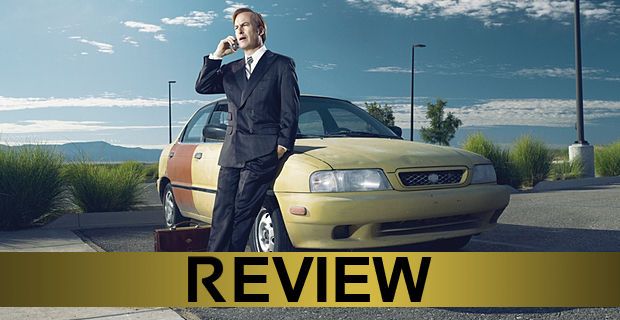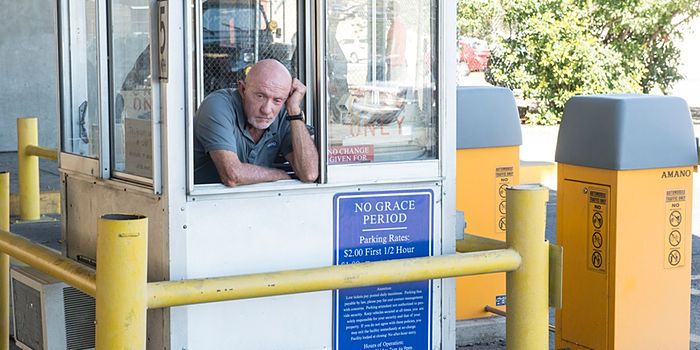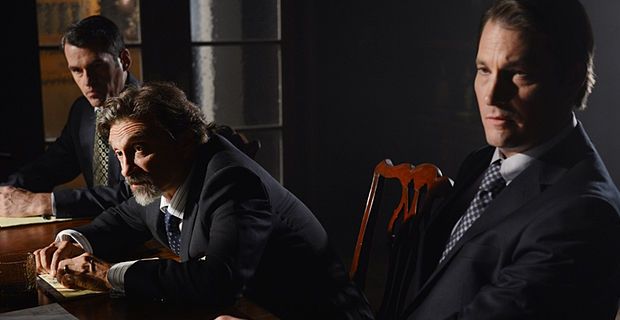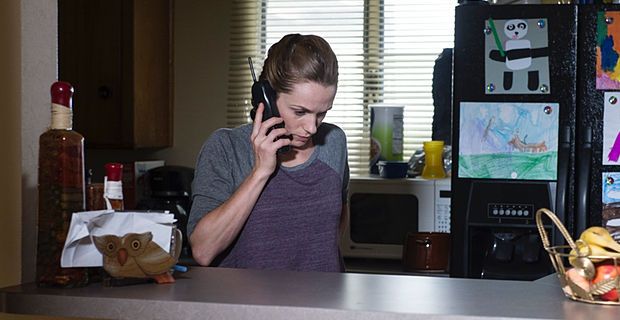[This is a review of Better Call Saul season 1, episode 8. There will be SPOILERS.]
-
One of the more remarkable aspects of Better Call Saul is the way in which the series is able to morph into whatever it needs to be on a weekly basis. Just a few weeks ago, the series was a hardboiled revenge thriller, following Mike on his journey to murder the men who killed his son, before tearfully announcing to his daughter-in-law he "broke" his boy. A week later, and the series was busy following the desperate exploits of the Kettlemans, as they ran from lawyer to lawyer, searching for a mythical acquittal that just wasn't going to happen.
Clearly, the series has a tremendous amount of breadth when it comes to the kinds of storytelling it is able to commit itself to. That means a tremendous amount of variation has come to be expected. Just look at where the show was after its first two episodes and where it is now: Jimmy was negotiating for the lives of two low-level skateboarding scam artists with Tuco Salamanca. A few weeks later, he's uncovering the fraudulent pricing practices of an Albuquerque retirement community (and beyond) that not only leads to what will potentially become his biggest case yet, but may also be just the thing to shake his brother Chuck free from the grip of a debilitating psychological disorder.
Variation can be a tricky thing, as the tonal shifts from week to week could easily become a series-defining inconsistency. So far, that hasn't been the case – well, not entirely. In fact, the series has become defined (however inadvertently) by its changeability, especially as it pertains to the range in tone and character depiction. But so far, that mutability hasn't led to questions of steadiness. It has, instead, helped point out just how confident the storytelling has been, while underlining the elements that remain consistent. Elements like, for example, the way Jimmy's efforts to make good on his promise to Chuck are undermined by those around him.
What has become increasingly obvious about the series, then, is how episodes like 'RICO' succeed in their ability to demonstrate why Jimmy had to become Saul Goodman and why Mike turned to criminal work.
'RICO' starts off with another flashback of a younger Jimmy McGill, one who has successfully shed the Slippin' Jimmy persona to become not only a seemingly valued member of the Hamlin, Hamlin & McGill law firm (as a mail clerk), but has also put himself through law school (he's an alumnus of University of American Samoa – "Go Land Crabs!") and passed the bar (after a few tries, apparently). That's a success story by any measure. But this is Better Call Saul, and even though it's the first season, the show has already trained its audience to know that any measure of success must then be met with failure, in equal or greater measure.
Last week, Jimmy finally landed the Kettlemans as clients, and was on the verge of expanding his elder law practice. But with Betsy Kettleman holding the $30K bribe Jimmy took over his head, and Kim being tossed out into the cornfield – thanks to Hamlin – he had no choice but to say goodbye to the prospect of success. That was a unique case, as Jimmy's hardship was due to his own lapse in judgment. Here, it's a little different, as Hamlin dismisses the idea of Jimmy joining the firm – but choses to do so during the cake-filled celebration thrown by his co-workers (including Kim). To further prove what a jerk he is, Hamlin even took a piece of cake for his troubles.
The scene positions the audience on the outside of the mailroom, looking through a set of windowpanes. The audio becomes muted, so Hamlin's exact words remain unknown, but the meaning is as clear as the window's smudge-free finish: Jimmy's not going to begin his legal career at his brother's law firm. This raises questions as to how much power Hamlin has at the firm – or, more the point, how little Chuck has. Or maybe it was Chuck's idea, and Hamlin gets to be the messenger. That might explain why Chuck was so willing to put in all those man hours reconstructing the shredded documents Jimmy "found", setting up the case against Sandpiper Crossing, and looking intimidating when Rick Schweikart (Dennis Boutsikaris) tried to bully them into accepting a measly $100K for a case clearly worth tens of millions of dollars. Perhaps, Chuck (and his psychological problem) is less motivated by a fear that Jimmy will revert back to his scam artist persona, and is more motivated (or caused by) a sense of guilt. Perhaps, then, Chuck's apparent recovery (absentminded as it was) at the episode's end wasn't a result of his reinvigorated love of the law, but rather the realization he was helping Jimmy be all he could be.
It's a stretch to be sure, but it might explain why Jimmy would want to distance himself from the McGill name. Then again, Chuck's use of his billing code is likely to come back to haunt Jimmy's Sandpiper case, most likely in the form of Howard Hamlin's desire to be a part of a $20 million lawsuit. And Chuck's efforts to prevent Hamlin from taking over may hold the answer to the questions posed above.
Hamlin's involvement in the Sandpiper case was telegraphed from the second Jimmy called Kim. But that doesn’t really hurt the effectiveness of the episode – Better Call Saul is built on leading the audience to various conclusions, so hiding them isn't necessarily going to change things from a storytelling perspective. Instead, it goes back to the element that the series holds above all others: The question of "why?"
That question not only helps fill in the gaps between Jimmy McGill and Saul Goodman, but it also positions Mike to go from lowly parking lot attendant to the criminal fixer everyone loves. It also gives Kerry Condon something to do for one small scene (if the show needs to improve anything, it would be the depth of her character), which color's Mike's decision to visit the veterinarian moonlighting as the Albuquerque underworld's hiring service.
By keeping the themes of ambition, disappointment, and guilt consistent and consistently satisfying, Better Call Saul echoes its forefather greatly, but it also makes variation in tone its greatest feature.
-
Better Call Saul continues next Monday with 'Pimento' @10pm on AMC. Check out a preview below:
Photos: Ursula Coyote/AMC




